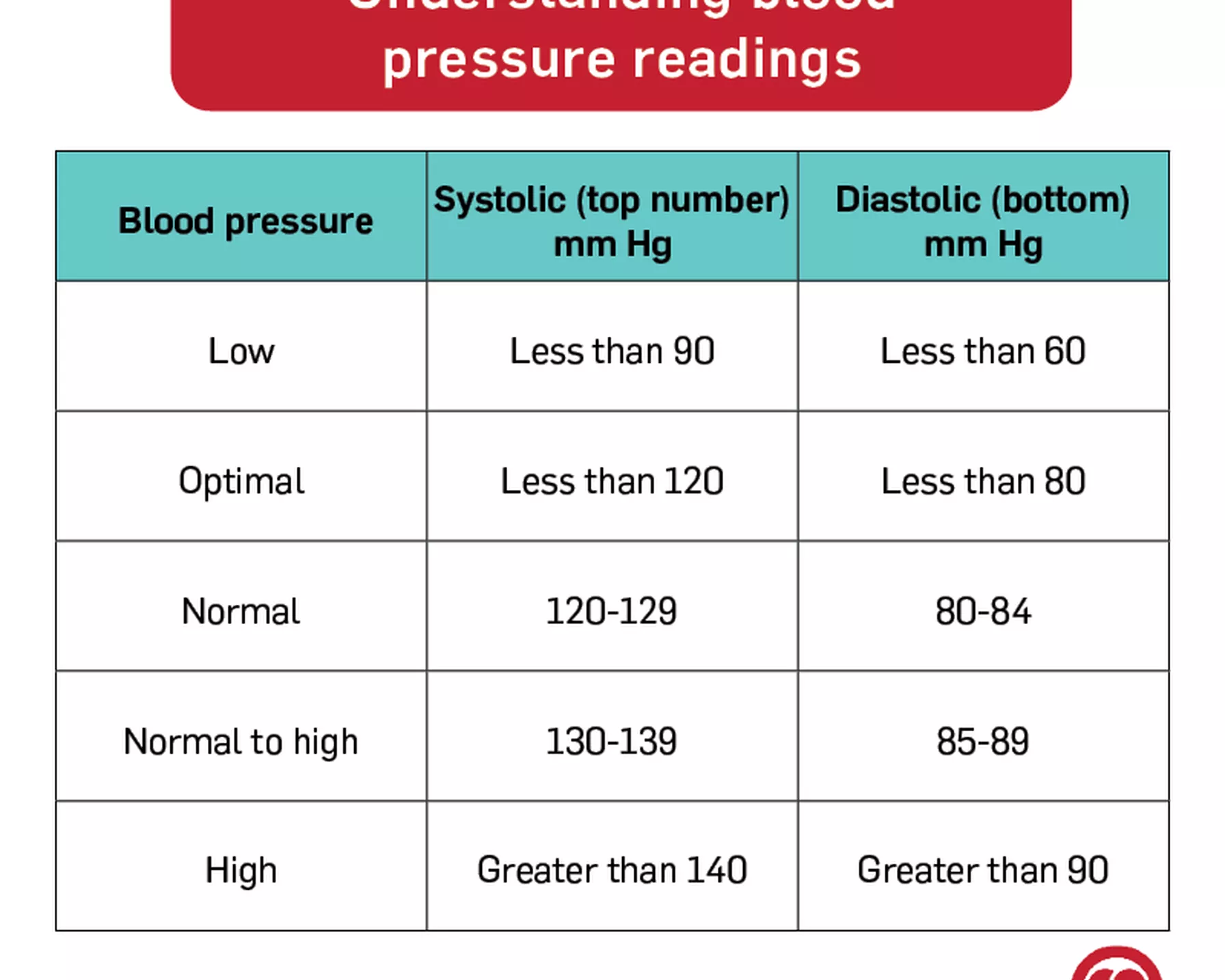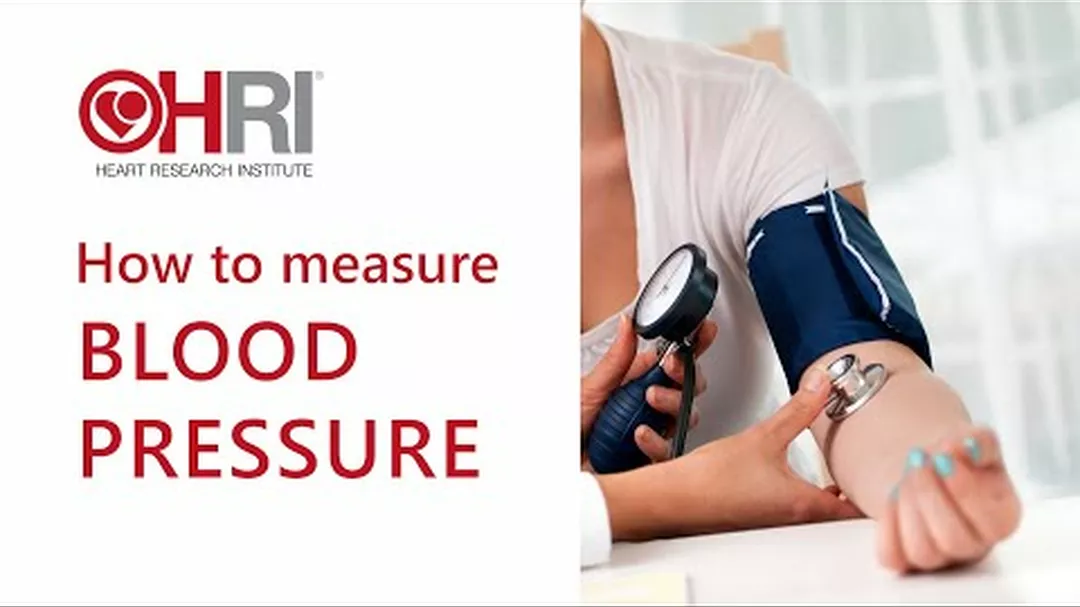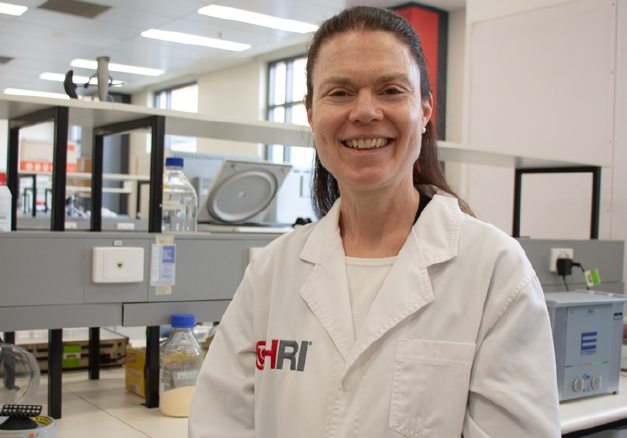What is high blood pressure (hypertension)?
Blood pressure refers to the amount of force placed by blood on the walls of the body’s blood vessels (arteries) as the blood is pumped through the arteries and around the body by the heart. It is determined by the amount of blood pumped by the heart and the amount of resistance to blood flow that the arteries have.
High blood pressure (hypertension) is when the force of the blood against the artery walls is higher than normal for an extended period of time or the long term. It is a common condition.
Australian adults has high blood pressure.1
High blood pressure is cause for concern as it can damage the arteries over the long term and is a major risk factor for heart conditions and cardiovascular diseases like coronary heart disease, stroke, heart attack, diabetes and heart failure. It can also speed up the process of atherosclerosis, which is the build-up of fatty plaques on the walls of the arteries and the main underlying cause of cardiovascular disease.
What causes high blood pressure?
High blood pressure occurs when too much force is applied to the artery walls by the blood as it is pumped around the body. This puts a strain on the arteries, and the heart also has to work harder to keep blood circulating around the body.
There are two types of high blood pressure: primary (essential) hypertension and secondary hypertension.
- Primary hypertension: This tends to slowly develop over time and has no identifiable cause. Most adults who have hypertension have this type.
- Secondary hypertension: This is when the high blood pressure is caused by an underlying condition. It can appear suddenly and cause blood pressure that is higher than that seen in primary hypertension. Some causes of secondary hypertension include: obstructive sleep apnoea, preeclampsia, kidney disease, thyroid problems, defects in the arteries, certain medications and illicit drugs.
Speak to your doctor if you have concerns about your blood pressure or want to get your levels checked.
Signs of high blood pressure
Does high blood pressure have any symptoms?
High blood pressure is often called a “silent killer” because most people with the condition experience no symptoms, and almost half of adults who have high blood pressure are unaware that they have it. This is why it is important to regularly check your blood pressure and know the measurements that are normal for you.
If symptoms of high blood pressure do occur, they can include an irregular heartbeat, headaches in the early morning, nosebleeds, changes in vision, and buzzing in the ears.
Severe high blood pressure can cause more serious symptoms, such as fatigue, nausea, vomiting, chest pain, muscle tremors, confusion and anxiety.
The risk of high blood pressure
Generally there is no single cause of high blood pressure, although there are several linked risk factors.
Factors that cannot be changed include the following.
- Family history: High blood pressure can run in the family.
- Age: As people get older, their blood pressure may change due to the arteries becoming more rigid over time.
- Gender: Men are more likely than women to have high blood pressure.
Managing high blood pressure risk
The risk factors that can be controlled through lifestyle changes include the following.
- High sodium intake: There is a well-established relationship between high intake of sodium (found in salt and other sources) and high blood pressure. Cutting down on salt will help to lower blood pressure and can make a difference very quickly. Making other dietary changes can help manage high blood pressure.
- Being overweight: Blood pressure rises as body weight increases. Being overweight can increase the risk of high blood pressure as well as the risk of heart disease and other risk factors, such as high cholesterol. Small lifestyle changes like eating a healthy diet and exercising regularly can help you reach and maintain a healthy weight.
- High alcohol intake: Drinking too much alcohol can raise blood pressure to unhealthy levels, and temporarily high levels can become permanently high with long-term excessive drinking. In some cases, heavy drinkers with high blood pressure can lower their levels by cutting back to moderate drinking.
- Smoking: This can increase the risk of atherosclerotic plaque and worsen the effects of high blood pressure on the arteries. If you smoke, quitting is one of the best things you can do for your overall health.
- Diabetes: This can worsen the effects of high blood pressure on the arteries. Leading a healthy lifestyle as well as making some dietary changes can help manage diabetes.
- Inactivity and lack of exercise: Leading a sedentary lifestyle can contribute to being an unhealthy weight and the risk of high blood pressure. Being physically active can help maintain a healthy weight.
High blood pressure effects and complications of high blood pressure
High blood pressure can cause damage to important organs in the body, such as the brain and kidneys. It is a major risk factor for cardiovascular disease and can cause serious damage to the heart if untreated or unmanaged.
High blood pressure damage to the arteries
Healthy arteries are normally flexible and elastic, with a smooth inner lining that allows blood to flow freely through.
Over time, the extra pressure placed on the artery walls from high blood pressure can damage the arteries and cause them to narrow, harden and become less elastic. Atherosclerotic plaque can build up and collect in the damaged arteries, further narrowing them, and decreasing the flow of blood and oxygen to the heart.
High blood pressure damage to the heart
In high blood pressure, the heart works harder than normal to pump blood around the body. Over time, this can cause various heart problems.
- Coronary heart disease: High blood pressure damages the arteries, which can decrease the amount of blood supplied to the heart. This lack of blood supply can lead to chest pain, irregular heartbeat or even a heart attack if the blood supply to the heart is blocked.
- Heart failure: High blood pressure places strain on the heart, which over time can cause the heart muscle to weaken and work less effectively. The heart can eventually fail and no longer be able to pump enough blood and oxygen around the body.
High blood pressure damage to the brain
High blood pressure can damage the arteries that supply blood and oxygen to the brain. These blood vessels may narrow, rupture or leak, and high blood pressure can also cause blood clots to form in them. When blood flow to the brain is blocked and the brain does not get enough oxygen and nutrients, this can cause a stroke. Brain cells will start dying until blood flow is restored.
High blood pressure in pregnancy (preeclampsia)
Preeclampsia is a serious condition where high blood pressure develops during pregnancy, affecting both the mother and unborn baby. It is the most common serious medical complication of pregnancy, affecting one in every 10 women during pregnancy.2
If untreated, preeclampsia can lead to serious complications, such as convulsions, kidney or liver failure, and blood clotting problems. In severe cases, preeclampsia can lead to maternal and infant death. In some cases, the baby needs to be delivered early. Preeclampsia also increases the risk of the mother developing cardiovascular disease in the future.
How to measure high blood pressure
Blood pressure is a measurement taken of systolic pressure over diastolic pressure, given as one number over the other, eg, 120/80. Both pressures are measured in millimetres of mercury (mm Hg).
- Systolic pressure: The top, larger number measures the pressure in the arteries when the heart beats (when the heart muscle contracts).
- Diastolic pressure: The bottom, smaller number measures the pressure in the arteries between heartbeats (when the heart muscle relaxes between beats).
The most common way to measure blood pressure is through a special inflatable cuff placed around the arm that is connected to a pressure-measuring gauge. You may have your blood pressure checked at your doctor’s clinic, and home blood pressure monitors are also available.
In some cases, your doctor may recommend further tests, such as urine and blood tests, to confirm the diagnosis and check for any underlying conditions that may be causing the high blood pressure.
What is considered high blood pressure?
Blood pressure changes to meet the body’s needs, and what is considered a healthy blood pressure can vary among people.
It is normal for blood pressure to be temporarily higher during periods of exertion, such as physical exercise. If blood pressure is high when you are at rest, this can be a concern because it indicates the heart is working harder than normal and that the arteries are being stressed.
Understanding blood pressure readings.
If your blood pressure is higher than normal, or you have other risk factors for cardiovascular disease, it’s important to keep an eye on your levels and have them checked more frequently. Your doctor can advise you for your individual circumstances.
What is considered low blood pressure?
People can also have low blood pressure (hypotension). Blood pressure is generally considered low if it is below 90/60, although this can vary among individuals. It can be a sign of good health in some people – generally those who are very fit and have a slow pulse. Low blood pressure is only a problem if it has a negative impact on the body or affects the way a person feels.
If you have concerns about your blood pressure, speak to your doctor.
Download a guide to checking your blood pressure
How to lower blood pressure
How to lower blood pressure naturally
If you have high blood pressure, there are ways to lower it naturally through lifestyle changes. Your doctor can advise you for your individual circumstances and determine if further interventions are needed.
- Follow a healthy diet: Eat a nutritious diet that is low in salt, saturated fat, trans fat, LDL cholesterol and sugar, such as plenty of vegetables, fruit and whole grains. Some foods also contain nutrients that can help blood pressure.
- Maintain a healthy weight: Being overweight increases blood pressure – losing excess weight can help lower blood pressure to healthier levels.
- Exercise regularly: Being physically active, through even everyday activities such as walking and gardening, can help lower blood pressure.
- Avoid or limit alcohol: In some cases, heavy drinkers with high blood pressure can lower their levels by cutting back to moderate drinking.
- Quit smoking: Quitting smoking can reduce the risk the developing high blood pressure as well as reduce its damaging effects on the arteries.
Sodium and high blood pressure
The body needs a small amount of sodium (found in salt and other sources) for good health. When there is more sodium than needed, the body holds onto water to dilute the sodium levels. This increases the amount of fluid surrounding the body’s cells as well as the volume of blood in the circulatory system, which places extra pressure on the blood vessel walls and leads to high blood pressure.
Dietary changes such as cutting down on salt can help manage high blood pressure, as well as avoiding packaged and processed foods, which are often high in salt.
High blood pressure medication
A wide range of high blood pressure medications (antihypertensive medications) are available. These may be prescribed by your doctor in addition to lifestyle changes.
Antihypertensive medications help to manage high blood pressure – they cannot cure high blood pressure. Most people who need to take antihypertensive medications will need to do so for the rest of their lives.
Your doctor will monitor your medication dosage and its effects carefully, and may alter the dose over time or prescribe additional medications to best manage your condition. It is important to follow the instructions for your medication carefully and never alter the dose or stop taking it without consulting your doctor.
The initial medications prescribed may include one or more of the following.
- Diuretics: These are often the first medications used to treat high blood pressure. They help the kidneys eliminate sodium and water from the body.
- Angiotensin-converting enzyme (ACE) inhibitors: These help to relax the blood vessels by blocking the formation of a chemical in the body that narrows blood vessels.
- Angiotensin II receptor blockers (ARBs): These help to relax the blood vessels by blocking the action, not the formation of a chemical in the body that narrows blood vessels.
- Calcium channel blockers: These help relax the muscles of the blood vessels, and some may slow the heart rate.
If high blood pressure remains uncontrolled despite treatment by these medications, additional medications that may be prescribed include the following.
- Alpha blockers: These reduce nerve signals to blood vessels, reducing the effects of natural chemicals that narrow blood vessels.
- Alpha-beta blockers: These block nerve signals to blood vessels and slow the heartbeat to reduce the amount of blood that must be pumped through the blood vessels.
- Beta blockers: These widen the blood vessels and reduce the work needed by the heart, causing the heart to beat slower and with less force.
- Aldosterone antagonists: These block the effect of a natural chemical that can lead to build-up of salt and fluid in the body, which can contribute to high blood pressure.
- Renin inhibitors: These slow the production of a chemical in the body that starts a chain of steps that increases blood pressure.
- Vasodilators: These work directly on the muscles in the walls of the blood vessels, preventing the muscles from tightening and the blood vessels from narrowing.
- Central-acting agents: These prevent the brain from telling the nervous system to increase the heart rate and narrow the blood vessels.
How is HRI fighting high blood pressure?
The Vascular Immunology Group is working to understand the causes and progression of preeclampsia (high blood pressure during pregnancy) and examining the links between high blood pressure and cardiovascular disease in women.
The Clinical Research Group is researching novel techniques for detecting high blood pressure in the lungs, also known as pulmonary vascular disease, a very severe condition affecting young adults and (more so) older people.
References
- Australian Institute of Health and Welfare; High blood pressure; Heart, stroke and vascular disease—Australian facts. Web report. 29 Sept 2021.
- Pearls: Preventing preeclampsia www.preeclampsia.org.au/index.html




